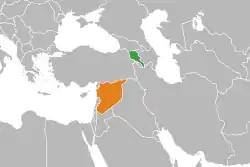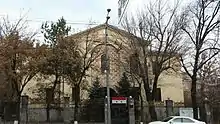Armenia–Syria relations
Armenian–Syrian relations are foreign relations between Armenia and Syria. Armenia has an embassy in Damascus and a consulate general in Aleppo. In 1997, Syria opened an embassy in Yerevan. Syrian Foreign Minister Farouk al-Sharaa visited Armenia in March 1992.[1]
 | |
Armenia |
Syria |
|---|---|
Syria established diplomatic relations with Armenia soon after the collapse of the Soviet Union. Syrian President Hafez al-Assad maintained good relationships in part because of the large Armenian community in Syria. Around 120,000 people of Armenian descent live in Syria. They compose a majority in the towns of Kessab and Yakubiyah, and play a part in the political life of Syria.
During the Armenian Genocide, the Ottoman Empire used the Syrian desert of Deir ez-Zor as the main killing fields of Armenians. The native Arabs sheltered and supported the Armenians. A memorial complex commemorating this tragedy was opened in the city of Deir ez-Zor.[2] It was designed by Sarkis Balmanoukian and was officially inaugurated in 1990 with the presence of the Armenian Catholicos of the Great House of Cilicia. The complex contains bones and remnants recovered from the Deir ez-Zor desert of Armenian victims of the Genocide and has become a pilgrim destination for many Armenians in remembrance of their dead, before being partially destroyed by ISIL.
Country Comparisons
| Populations | 2,924,816 | 17,064,854 |
| Area | 29,743 km2 (11,484 sq mi) | 185,180 km² (71,500 sq mi) |
| Population density | 101.5/km2 (262.9/sq mi) | 118.3/km2 (306.4/sq mi) |
| Capital | Yerevan | Damascus |
| Largest city | Yerevan | Damascus |
| Government | Unitary parliamentary republic | Unitary Dominant-Party Semi-Presidential republic |
| Official languages | Armenian | Arabic |
| Main religions | 94.8% Christianity, 4% Not Religious, 0.8% Yazidism, 0.4% Other | 87% Islam, 10% Christianity, 3% Druzism |
Syrian Civil War

Despite the country's ongoing Syrian Civil War, the Armenian embassy is still open in Damascus and the countries maintain diplomatic relations.
Following president Bashar al-Assad's victory in the 2014 Syrian presidential election, Armenian president Serzh Sargsyan congratulated Assad, saying, "I wish you [Bashar al-Assad] good health and successes and I wish the friendly Syrian people eternal peace."[3]
Armenia has also provided tons of humanitarian aid to Syria throughout the civil war, most notably sending 40 tons of humanitarian aid including relief and food items in 2017. Armenian Ambassador Arshak Poladian stated that the aid “came under the directives of the President of Armenia and presented by the Armenian people.”[4]
Armenian Genocide and Nagorno-Karabakh
Syria recognized the Armenian Genocide in 2015, becoming the second Arab state after Lebanon to do so, which was perceived positively by Armenia and Armenians. This came amidst the straining of relations between Syria and Turkey. The Turkish Government was angered over the recognition. Armenia is accused by both Turkey and Azerbaijan of allowing Syrian refugees to resettle in Karabakh, amidst diplomatic tensions between Turkey and Syria.[5] In 2020, when the 2020 Nagorno-Karabakh conflict erupted, Syrian leader Bashar al-Assad voiced his support for Armenia, accusing Turkey of sending terrorists into the region.[6]
References
- Zisser 1995, p. 733.
- "Monument and Memorial Complex at Der Zor, Syria". Retrieved 4 December 2014.
- "President Sargsyan congratulates Syria's Assad on re-election". 13 June 2014.
- "Armenia sends 40 tons of humanitarian aid to Syrian people -Syrian Arab News Agency". Syrian Arab News Agency. 9 June 2017.
- http://www.hurriyetdailynews.com/syria-armenians-move-to-nagorno-karabakh-azerbaijan-55588
- https://www.al-monitor.com/pulse/originals/2020/10/assad-erdogan-nagorno-karabakh-turkey-russia-armenia-azeri.html
Bibliography
- Zisser, Eyal (1995). Ayalon, Ami (ed.). Middle East Contemporary Survey. 16. The Moshe Dayan Center. ISBN 9780813321332.

